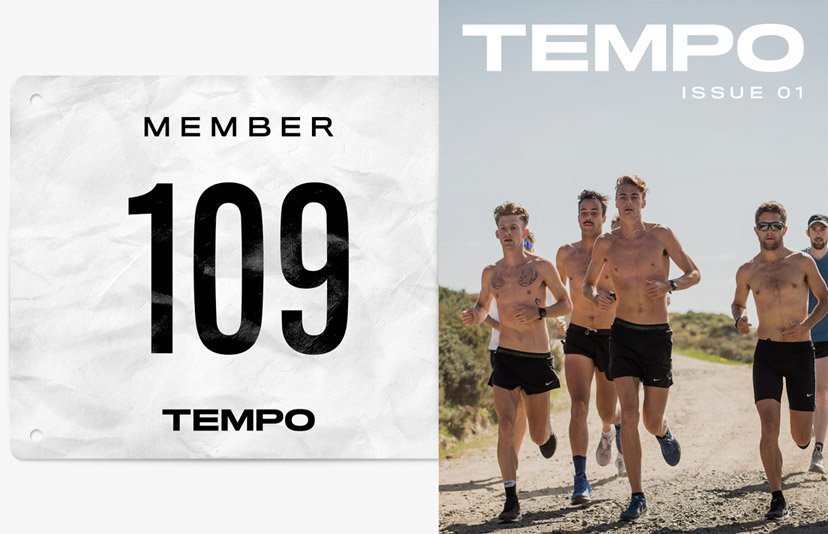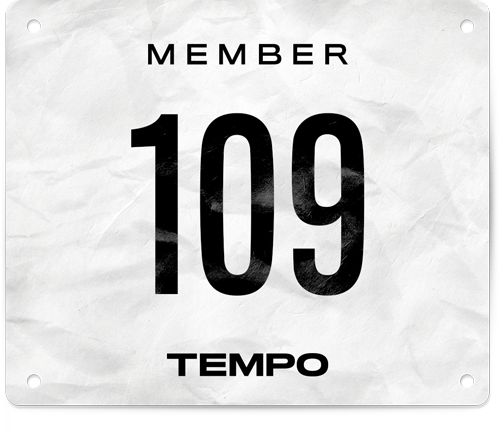Culture
Running Sucks – And That’s Why It Matters
Raziq Rauf’s Journey from Substack Provocateur to Published Author
When Raziq Rauf headed to New York City during this year’s marathon week he was, like a lot of people, keen to face a new challenge. He wasn’t there to run the major though. His wall of pain was to get on stage and deliver a 10-minute monologue about “shitting [him]self in public” as part of a “first timers” storytelling night organised by funny runner Laura Green.
Raziq spent the rest of race week soaking up the brand activations, exhibitions, talks and general pre-race hysteria that descends on the city every November. It was all in the name of research, he says, though he quickly corrects himself: “Really it’s just life experience.”
This is vintage Raz – the running writer who refuses to race, the culture critic immersed in what he critiques, the guy who named his newsletter “Running Sucks” while dedicating his life to thinking about running. Now, after two-and-a-half years of weekly provocations that have made him required reading for anyone trying to understand where running culture is heading, he’s finished his first book, This Is Running.
“Running culture cannot ‘peak’ because running culture is just a way of describing how runners interact with the running world.”
Raziq Rauf
Culture vs Commerce
It was a post about the London Marathon earlier this year that really announced Raziq as someone worth paying attention to. Various Instagram accounts were breathlessly declaring that “running culture” had peaked, but their definition of culture seemed limited to brand activations and expensive gear. Raz’s response was blunt: “Capitalism is not culture.” Instead, he wrote, culture is “an ever-evolving way of understanding how people interact with their part of the world. As such, running culture cannot ‘peak’ because running culture is just a way of describing how runners interact with the running world.”
Many runners might feel that there is an over-saturation of brands and consumer-oriented activations – especially around big events – but that’s not, and cannot be, the same thing as running culture “peaking”.
“It’s not that brands don’t form culture,” he clarifies when we ask him about it. “But the resolute focus on brands, and brands only, pissed me off.” His critique isn’t simplistic brand-bashing, either. Raz understands the role commerce plays in modern running, even if he wishes it were different. “I think they’re playing the role that they’re allowed to play,” he says of brands. “If there wasn’t demand for them, if they weren’t making money hand over fist, then they wouldn’t be doing it.”
“There is not one running culture. You can talk about running culture only in terms of all the subcultures within running culture.”
Raziq Rauf
What really interests him is the psychology behind the consumption. He’s developed a theory that connects the current running boom to broader economic anxieties, particularly among young people. “Fewer and fewer young people are able to buy a home,” he observes. “So that means that they actually have more disposable income even if their future is looking more bleak. And so they will spend that income because there’s no point saving 50 grand to buy a house."
This leads to what Raz sees as almost nihilistic spending patterns – dropping US$300 on running shorts, $2,000 on a full kit. “It feels vulgar to me,” he admits. “Why have you spent two grand on your running fit when you could have spent $1000 and maybe donated $1000 and some of your time to a charity?”
Yet Raz can also recognise when brands get it right. When wildfires hit LA in January, New Balance asked his small neighbourhood run crew, Glendale Runners, how they could help. “A week later there were two boxes of t-shirts at my front door,” he recalls. The crew sold them and raised $2,000 for an animal charity near the fires. “They haven’t asked for anything since. It was an easy lift for them. It probably cost them a grand.” That, he suggests, is brands at their best – responsive, hands-off, supportive without being extractive.
“It’s not that brands don’t form culture. But the resolute focus on brands, and brands only, pissed me off.”
Raziq Rauf
Crews Are Only a Mirror
It’s also a distortion, Raziq says, to mistake the explosion of run crews over the past few years – including the rise of media-baiting mega meets from Venice Beach to Bondi – for the totality of running culture.
“There is not one running culture. You can talk about running culture only in terms of all the subcultures within running culture,” he says. “You’ve got the urban run crew phenomenon, sure, but then you’ve still got the solo marathoner, people doing group training runs for marathons; you’ve got track culture.” Even within trail running you have different cultures shaped by geography: fell running in the UK attracts a very different scene than has developed in the US Rockies.
Even if we do look specifically at crew culture, we should understand what’s happening to it as a mirror of culture more widely. “Every subculture might have ideas about what they want running culture to be. For instance, I might want fewer brands in running culture, because I’m naturally left wing in all my thoughts, but somebody else who is an entrepreneur might want more brands.”
At university, “I focused on human geography … how people and place relate to one another in cities in particular. That formed how I think about the world, essentially.”
Raziq Rauf
The Outsider’s Eye
Raziq’s path to becoming running’s most interesting critic started in an unexpected place: music journalism. For years he wrote for Kerrang!, Metal Hammer and Classic Rock, living what he readily admits was “an unhealthy lifestyle”. The child of Bangladeshi immigrants (”I bet you can’t name a single runner from Bangladesh,” he says), he grew up in London, where he joined the “unfashionable” high school track team because he wasn’t good enough for the football side. He went on to study geography at Manchester, and spent his university years focused on “human geography, how people and place relate to one another in cities in particular”.
“Geography forms the foundation of a lot of my ideas about culture,” Raz explains. “That formed how I think about the world, essentially.” This academic grounding would prove crucial when he eventually turned his attention to running.
“Brands play the role that they’re allowed to play. If there wasn’t demand for them, if they weren’t making money hand over fist, then they wouldn’t be doing it.”
Raziq Rauf
When he moved to LA in 2014, following his Scottish wife who’d relocated for work, Raz used running as a way to decode his new city. “I did use races like 5Ks and 10Ks to get to know the city,” he says. “I moved here when I was 30, brand new city, didn’t know it.”
His first attempt at joining LA’s run crew scene was a disaster – or at least, a revelation. Showing up at a Blacklist run at LACMA, he found himself surrounded by 500 people. “I was like, ‘This is not for me. It’s just too many people. It’s overwhelming,’” he recalls. That experience would shape his entire philosophy about running culture: the search for something more human-scaled, more intentional, less swept up in the hype.
He eventually found his people at LA Craft Runners, who ran from a different brewery each week. “I can go have a beer and hang out with people who have two things in common with me,” he says. Now he runs variously with Glendale, Silver Lake Track Club, Eagle Rock Run Club and has even reconnected with Blacklist – though thankfully, he notes, there are “10 to 20 times fewer people” now that there are so many more crews and clubs across the city.
“Every subculture might have ideas about what they want running culture to be. For instance, I might want fewer brands in running culture, because I’m naturally left wing in all my thoughts, but somebody else who is an entrepreneur might want more brands.”
Raziq Rauf
The Book – Final Boss Level
This Is Running represents what Raz calls “the final level boss” of his newsletter. Published by Batsford Books in the UK and distributed by Rizzoli via Random House in the US, it’s due out in early April 2026. He chose Batsford specifically because “they make really beautiful looking books”, understanding that “as much as you can’t judge a book by its cover, you absolutely can and do.”
The book is a collection of essays and interviews covering what Raz describes as “every aspect of running that I could think of”. Topics include health, technology, super shoes, run clubs, brands, the female experience, trails, marginal gains, storytelling and celebrities. Some material draws from his newsletter, but he’s quick to clarify that “these are essays that might have taken bits and bobs from 10 different posts”.
The through line, he hopes, is his consistent message about mindful engagement with running. “I’ve always said that I want people to think more deeply about running,” Raz explains. “It’s something that we spend tens, dozens of hours of our week doing. And to spend that much time on a hobby and not think about it deeply seems silly to me.”
He wants readers to think about “not just following the crowd, not just doing what’s popular” but considering “the races that they run, who they run with, where they run”. His goal is ambitious: “I think people can reach a different level of happiness and enlightenment through their running practice.”
“I’ve always said that I want people to think more deeply about running.”
Raziq Rauf
Running Without Racing
Perhaps nothing defines Raz’s sometimes contrarian stance more than his complete disinterest in racing. When we ask about it, his response is immediate and emphatic: “Fuck that.”
“Getting up at 4am to run at 9am is counterintuitive to my whole ethos,” he elaborates. “I don’t care about the medal. I don’t care about getting a personal best on a course. He’s quick to note that he can hold his own, regularly running 10 to 15 miles with friends training for marathons, and has covered 20 miles multiple times this year – “which is longer than most people have run, even people who train for a marathon”.
But racing, especially big races, represents everything he finds problematic about modern running culture. “There’s a lot of standing around waiting,” he says. “And it’s a high-risk thing.” Nursing an injury when we catch up, he imagines how devastating it would be to get injured two weeks before a major marathon: “Setting myself up for heartbreak isn’t on my list of things to do.”
Racing isn’t where he seeks legitimacy, he says. “Somebody asked me, are you more of a writer or a runner? I’m like, ‘I’m a writer.’ I run but I’m a writer. That’s how I identify.” Running is essential to his life, but it’s a secondary activity, the thing that supports the primary work of thinking and writing. His actual running life is deliberately low-key. A USATF-certified coach, he leads a Tuesday morning run in Glendale – “the most deeply unfashionable time to have a run crew” – that attracts between five and 15 people. “I know every single person that I run with,” he says with satisfaction.
“Brands help shape the culture, certainly. But do we need them as runners, as humans? No, not really. We’ll still run regardless.”
Raziq Rauf
Evolution, Not Peak
If, as we’ve explored, culture can’t peak because it’s just a way of describing how people interact with their part of the world, what Raz sees is endless evolution, particularly toward more pluralistic and specific communities. He’s excited about the emergence of identity-based run clubs – a women-only South Asian run club in London, or interest-based crews like the cinephiles who run to various film locations in LA.
“I see no problem with having a run club in every neighbourhood,” he says. “Why not? If there’s enough people to have 20 people on a run – amazing.” He envisions a future where crews splinter and multiply based on every possible affinity – neighbourhood, identity, interest, pace, philosophy.
But he’s not naive about where things are heading. When I suggest the evolution of running culture mirrors the internet’s progression from DIY frontier to corporate dominance, he agrees it’s “a really good analogy”. He tells a story about a favourite app called Detour that provided walking tours, which got bought by a big tech company and “stripped for parts” – the perfect metaphor for his fears about certain parts of running culture.
Everybody, from a first-time runner to someone running their hundredth marathon, at some point during the run they’ll think, ‘This sucks.’ So there’s truth in it.” Raziq Rauf on the name Running Sucks
“Billion-dollar companies don’t really care about what’s best for us running on the street,” he says. “They care more about their shareholders. They care more about increasing their revenue from $20 billion to $25 billion.”
And yet, Raz maintains a kind of philosophical optimism. “We’ve always got running,” he points out. “Doesn’t matter if there are any brands – we’re still running. The personal experience of running will always be there.”
“Brands help shape the culture, certainly. But do we need them as runners, as humans? No, not really. We’ll still run regardless. If I came down to Australia and went for a run with you, it wouldn’t matter what we’re wearing, you know? I couldn’t give a shit what brand you were wearing, you know? It doesn’t make a difference – like a brand activation at a marathon, for example, that’s not what you’re going to remember about running that marathon. You might remember that that was the year that you finished without stopping or you got sub-four-hours or you ran with your friend, but you probably won’t remember the X brand activation beforehand or which shakeout run you went to. They [brand activations] are very much a footnote for me. The running takes precedence.”
“Somebody asked me, are you more of a writer or a runner? I’m like, ‘I’m a writer.’”
Raziq Rauf
Raz takes the same attitude towards his solo runs, which make up the majority of his weekly miles. He doesn’t care what anyone thinks about his 20-year-old Nike shorts or what the latest shoe technology promises. “I run for my health, both physical and mental health,” he says simply. “If I’m going for a run tomorrow, it doesn’t matter what I’m wearing.”.
As our conversation winds down, we ask why he called his newsletter “Running Sucks.”
“Because I like to have fun,” he says first, then gets serious. “But also because it does.” He explains his underlying coaching philosophy: once you identify what sucks about running, you can improve it. “Everybody, from a first-time runner to someone running their hundredth marathon, at some point during the run they’ll think, ‘This sucks.’ So there’s truth in it, but it’s also a funny thing to say for somebody who spends half their life writing about it.” That paradox – celebrating something while acknowledging its difficulties, loving something while maintaining critical distance, being embedded in a culture while questioning its values – defines everything Raz writes. He’s proof that the most valuable voices in any culture are often the ones standing slightly to the side, watching carefully, thinking deeply – refusing to just follow the crowd.
“I try not to be a dickhead about it, that’s all,” he says in summary. “You can have different points of view and not be a dickhead. I firmly believe in that.”
In running culture circa 2025, that might be the most radical position of all.
This Is Running will be published in April 2026 by Batsford Books in the UK and distributed by Rizzoli/Random House in the US. You can preorder it from Bookshop (US buyers go here, UK buyers here) or in Australia through Booktopia.


